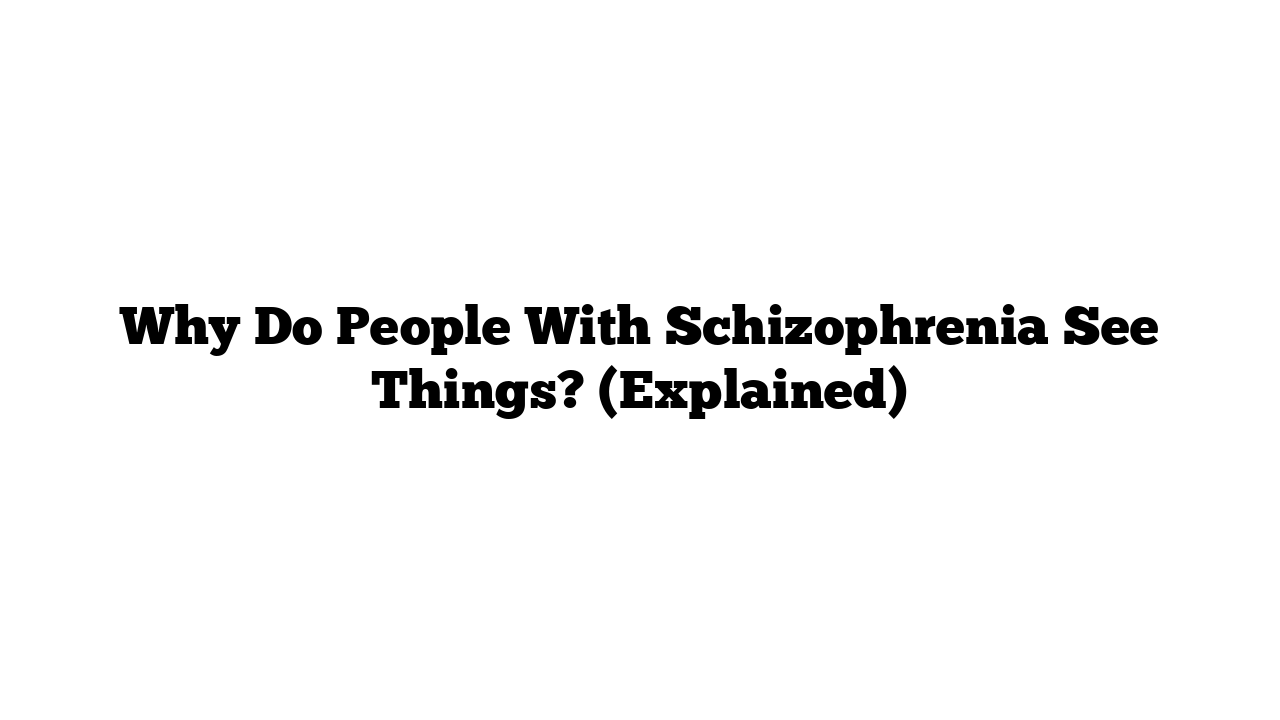Schizophrenia is a fascinating yet misunderstood mental health disorder, often associated with symptoms like hallucinations and delusions. To better understand why people with schizophrenia experience such symptoms, it’s essential to explore the condition’s complexities, including its causes, symptoms, treatments, and historical examples like Vincent van Gogh.
Schizophrenia: A Brief Overview
Schizophrenia is a chronic mental health disorder affecting emotional, intellectual, and behavioral functioning. People with schizophrenia may face challenges in maintaining relationships, succeeding academically or professionally, and coping with daily life. This disorder often manifests through psychotic episodes, during which individuals lose touch with reality.
When Does Schizophrenia Typically Appear?
Schizophrenia usually develops in adolescence or early adulthood, but it can sometimes appear earlier or later.
- Men: Symptoms often begin in the late teenage years to early 20s.
- Women: Symptoms typically appear in the late 20s to early 30s.
Early warning signs, known as the prodromal period, might include difficulties with sleep, mood changes, withdrawal from social interactions, and strange thoughts.
Symptoms of Schizophrenia
Schizophrenia symptoms fall into three primary categories: positive, negative, and cognitive.
1. Positive Symptoms
Positive symptoms involve added experiences that are not present in healthy individuals, such as:
- Hallucinations: Seeing, hearing, or feeling things that aren’t real. Hearing voices is the most common type.
- Delusions: Strong beliefs that contradict reality, like thinking someone is out to harm you.
- Disorganized Thinking: Confused speech or writing that doesn’t make sense.
- Catatonia: Holding one position for an extended period without movement.
2. Negative Symptoms
Negative symptoms represent a loss of abilities or behaviors, including:
- Lack of emotional expression.
- Difficulty maintaining motivation or enthusiasm.
- Withdrawal from social activities and neglecting personal hygiene.
3. Cognitive Symptoms
Cognitive symptoms affect memory, focus, and decision-making, making it difficult for individuals to process information or complete tasks.
Why Do People See or Hear Things?
Hallucinations, a hallmark of schizophrenia, result from abnormal brain activity in areas related to perception. For example, overactivity in auditory regions may cause individuals to hear voices. This phenomenon is linked to:
- Neurotransmitter Imbalances: Issues with dopamine and glutamate signaling can affect how the brain processes stimuli.
- Environmental Factors: Stress, trauma, or drug use (like marijuana) can trigger or worsen symptoms in those predisposed to schizophrenia.
- Brain Circuitry: Miscommunication in brain regions responsible for processing sights and sounds might contribute to hallucinations.
What Causes Schizophrenia?
Although the exact cause of schizophrenia remains unknown, researchers have identified several contributing factors:
1. Genetics
A family history of schizophrenia increases the risk, but it’s not a guarantee. For instance:
- General population risk: Less than 1%.
- Risk with an affected parent or sibling: About 10%.
- Risk for identical twins: Up to 50%.
2. Environmental Factors
- Prenatal Stressors: Poor nutrition or infections during pregnancy may increase the likelihood of schizophrenia.
- Substance Abuse: Marijuana use, particularly in adolescence, can heighten the risk.
3. Brain Abnormalities
- Neurotransmitter imbalances can lead to hallucinations and delusions.
- Brain scans of people with schizophrenia often reveal differences in structure and function compared to those without the condition.
Treating Schizophrenia
While there is no cure for schizophrenia, treatments focus on managing symptoms and improving quality of life. Common approaches include:
- Medication: Antipsychotics help reduce hallucinations and delusions.
- Therapy: Cognitive-behavioral therapy (CBT) teaches coping strategies for managing symptoms.
- Hospitalization: Short-term care may be necessary during severe episodes.
- Innovative Treatments: Techniques like deep brain stimulation and electroconvulsive therapy are being explored.
Historical Example: Vincent van Gogh
The life of Vincent van Gogh offers a poignant case study. Known for his vibrant artwork, Van Gogh struggled with mental illness. Some experts speculate he had schizophrenia based on his behavior, including:
- Withdrawal from friends and family.
- Auditory hallucinations, like hearing voices.
- Erratic behavior, such as cutting off his ear and eating paint.
Although we can’t definitively diagnose Van Gogh with schizophrenia, his struggles highlight the profound impact mental illness can have on creativity and life.
Living with Schizophrenia
People with schizophrenia often face stigma, but with the right support, they can lead fulfilling lives. Early diagnosis, combined with a strong support network, can make a significant difference.
If you or someone you know is struggling, visit resources like medicaltimes.io or seek help from trusted healthcare professionals.
FAQs about Schizophrenia
1. Can schizophrenia develop in children?
Yes, though rare, childhood-onset schizophrenia can occur after age 5.
2. What triggers schizophrenia?
Triggers may include genetics, substance use, trauma, or significant life changes.
3. Are people with schizophrenia dangerous?
Most individuals are not violent; they are more likely to harm themselves than others.
4. How is schizophrenia diagnosed?
Through a combination of clinical interviews, medical history, and ruling out other conditions.
5. Can schizophrenia be cured?
No, but treatments can help manage symptoms effectively.
6. Is schizophrenia genetic?
Family history increases risk, but other factors also play a role.
7. Can stress worsen schizophrenia?
Yes, stress can trigger or exacerbate symptoms.
8. What’s the difference between hallucinations and delusions?
Hallucinations involve sensing things that aren’t real; delusions are false beliefs.
9. Does marijuana use cause schizophrenia?
It doesn’t directly cause schizophrenia but can increase the risk in predisposed individuals.
10. How can families support someone with schizophrenia?
By offering patience, understanding, and helping them access professional care.
